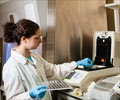California has asked genetic-testing companies offering their services online to keep off the state residents. It is the second big state to do so. The state health department sent cease-and-desist letters to 13 such firms.
High-profile gene testing companies that operate in California include 23andMe, founded by the wife of a top Google billionaire, and Navigenics, based in Redwood Shores.Both companies use DNA chips to scan a person's genome for gene variants that can be used to predict increased risk of developing a wide variety of diseases. DeCode Genetics of Iceland offers a similar consumer test.
California law requires that a licensed physician order any lab tests, including genetic tests, says Karen Nickel, chief of laboratory field services for the California Department of Public Health. All lab tests must also be validated for accuracy and medical utility, according to state requirements, Nickel says.
"These businesses are apparently operating without a clinical laboratory license in California. The genetic tests have not been validated for clinical utility and accuracy," says Nickel. "And they are scaring a lot of people to death."
Requiring that such tests demonstrate clinical "utility" could pose a particular problem if applied to 23andMe: The company has admitted its tests are not medically useful, as they represent preliminary findings, and so are merely for educational purposes.
California's move follows a crackdown on online gene testing firms by the state of New York, which sent warning letters to a number of firms, including 23andMe and Navigenics. California said its investigation followed a number of consumer complaints. "The consumers were unhappy about the accuracy [of the tests] and thought they cost too much," a spokeswoman for the department said
Advertisement
The companies offer genetic tests that look for DNA mutations associated with a higher risk of developing heart trouble, dementia, or other maladies. Some critics have said that the science behind some of these tests is relatively new and may be incomplete.
Advertisement
Companies offering the tests have made a point of sidestepping doctors, insisting that consumers have a right to know the information coded in their genes. They also have said that the results they deliver are informational, not diagnostic.
Bypassing traditional medical outlets is an important issue for these companies, since much of the medical establishment hasn't yet embraced widespread genetic testing. Traditional health-care providers tend to be skeptical of the usefulness of the results.
Medical Genetic testing will and should fall in the realm of healthcare and practitioners, some insist.
But Daniel Macarthur, an Australian genetic researcher argues, “What we're seeing here is to some extent a turf war, with the medical establishment trying to use legislation to claw back deference and power that used to be theirs automatically. Unfortunately for them, we're already living in a world in which people justifiably feel a strong sense of ownership over their genetic information; that's not going to change, and doctors will simply have to adapt to the new rules of play. But he too concedes assistance of a clinician is necessary.
The federal Department of Health and Human Services plans to hold hearings in Washington next month to investigate online genetic testing. The hearings could lead to federal regulations.
As society sorts through the promise of this technology, doctors, hospitals, and other powerful economic and political stakeholders are likely to join the debate. Public-health bureaucracies also will continue to weigh in if they feel that these tests are a danger to the public.
Eventually, the stakeholders will come together, as they should, to forge a new mandate. What exactly this new DNA regime will look like will depend on all parties working together to insure what I believe should be three criteria for genome-wide genetic testing:
Individuals have freedom of access to their personal genetic data.
A system of trials and approvals be implemented that insure the validity of genetic tests and risk factors.
Doctors and other experts have a vital role in the analysis of disease-oriented information and should use it as part of an overall diagnosis for a patient's health.
Balance is the key here, as in so many debates about markets. Overregulation can squelch innovation; under-regulation may lead to commercial abuse, consumer confusion, and distrust of these tests, says David Ewing Duncan, writing in the website Wired.
Source-Medindia
GPL/L











